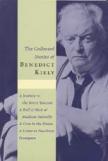Storytelling at Its Irish Best
In the very useful Penguin Book of Irish Fiction (2000), editor Colm Tóibín ultimately selected but one short story from the prolific Benedict Kiely, an unenviable task to say the least. Tóibín chose Homes on the Mountain, a modest-seeming tale about a 12-year-old boy and his extended family, two reclusive brothers and the plight of Irish immigrants who make it back to Ireland only to be dismissed as returned Americans.
Ultimately, though, it could also be argued that Homes on the Mountain is simply about the peculiar power of song in Ireland, its power to rouse emotions ranging from sentimentality to rage. In this sense, then, Homes on the Mountain is indeed representative of many Kiely stories. They have the deceptive simplicity of song, even as they explore both the brightest and darkest places of the humannot just the Irishsoul.
In the title story to his earliest collection, A Journey to the Streams (1963), Kiely’s narrator reels off a list of Irish villages, then says: The reiterated music of their names worked on him like a charm. The same could be said about the bulk of Kiely’s work, which reflects a strong desire to balance that which is good and bad, grave and gay, as one character in the story "Wild Rover No More" comments (fittingly) about a funeral procession.
For American readers largely unfamiliar with Kiely, his Collected Stories has just recently been published in the United States. This is a hefty collection of nearly 50 stories, from a writer whose work spans nearly five decades. The stories are taken from such Kiely collections as A Journey to the Seven Streams, A Ball of Malt & Madame Butterfly and A Letter to Peachtree. This edition also includes Kiely’s widely praised novella about Northern Ireland, Proxopera. Regrettably, this American edition does not include the insightful introduction by the novelist Colum McCann that accompanied the U.K. edition.
Nevertheless, Kiely’s work more than stands up for itself. His early stories have a particularly buoyant feel. Set largely in and around village life in Ireland (though "Ten Pretty Girls" makes a memorable trip up to Belfast), they are populated with colorful, eccentric yet poignant characters.
The subject matter ranges from romance and old age ("A Bottle of Brown Sherry") to life in the islands and isolated sea-front towns of Ireland ("The Weavers at the Mill"). But Kiely consistently offers unpredictable turns of plot and prose. There is a particularly memorable digression in one story about five brothers who emigrated to Chicago and made a fair fortune. At least four of them did. The fifth was murdered.
Kiely was born in 1919 in County Tyrone. He pondered the priesthood but instead made a name for himself as a journalist at The Irish Press. He immediately began writing fiction, much to the chagrin of some in Ireland, who thought censorship the proper way to deal with him.
Kiely’s early novels include Land Without Stars (1946), Call for a Miracle (1948) and In a Harbour Green (1949). Kiely ultimately published some two dozen books, including novels, non-fiction and memoirs. A Journey to the Seven Streams was his first story collection, followed 10 years later by A Ball of Malt & Madame Butterfly, whose title story is as memorable as the title itself. Later stories feel slightly more subdued, and politics, present in the earlier works (particularly his novels), begins to play an even more prominent role.
Kiely has been called Ireland’s Balzac, and with his rich casts of characters it is a title he deserves. His stories, however, are not what one would call polished or well-crafted in the traditional Chekovian sense. McCann was onto something when he wrote of Kiely’s vast discursiveness, adding that the stories are lyrical, allusional, purposefully digressive.
Kiely’s stories tend to be filled with long, packed sentences and have the quality of a spun yarn. His is certainly a distinctive style, but it is one that sometimes demands a bit from the reader, particularly non-Irish ones, given the author’s soft spot for colloquialisms. Those willing to do the work, however, will be glad they did, because at his best, Kiely is up there with the 20th-century’s top short story writers.
Having Kiely’s stories in chronological order allows the reader to chart his evolution. Later stories seem more languid, culminating appropriately with Proxopera: A Tale of Modern Ireland, his 1977 novella. The story involves a family, headed by a retired teacher, taken hostage by terrorists. The writing, particularly about the natural world, is lush and compelling. Some of the dialogue simply feels like a debate about the pros and cons of the bullet and the ballot.
But then Kiely unspools an exchange like this, reminding you how good he is: He has a heart condition.
Lady, we all have heart conditions.
If that is true (and it certainly is), then The Collected Stories of Benedict Kiely is as good and thorough a reading of the contemporary Irish heart and soul as you are likely to come by.
This article also appeared in print, under the headline “Storytelling at Its Irish Best,” in the June 7, 2004, issue.








